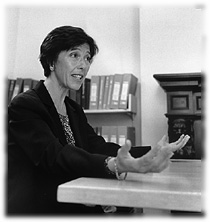Main Menu · Search ·Current Issue ·Contact ·Archives ·Centennial ·Letters to the Editor ·FAQs
For more alumni web resources, check out Harvard Gateways, the Harvard Alumni Association's website
 Pauline Tesler explained collaborative law at Harvard last spring. KRIS SNIBBE
Pauline Tesler explained collaborative law at Harvard last spring. KRIS SNIBBE |
Under "collaborative law" guidelines, which Tesler helped develop, divorcing spouses and their attorneys make a commitment not only to avoid court, but even to avoid the threat of going to court; the lawyers' task is to facilitate an agreement that addresses the legitimate needs of both parties. Collaborative law differs from mediation, Tesler says, by giving each spouse an advocate who is also an experienced negotiator. "Mediators must stay neutral," she points out. "If they attempt to redress an imbalance in cases where one spouse is financially dependent or less knowledgeable, they lose their credibility. Mediation results can also be undermined or distorted later in court. What our group aims for is genuine collaboration and a win-win outcome with attorney involvement from the start. Such outcomes might not be obtainable in the courts, where judges rarely have the time and tools at their disposal to tailor refined, creative solutions for complex individual problems."
Tesler is gratified that interest in collaborative law is growing in many different parts of the country, and that she and her associates have been able to share information about the guidelines and their experience with them. Clients like the approach, she says, because it reduces risk and expenditure while providing representation and support at a difficult time. Judges like an alternative form of dispute resolution that shrinks overcrowded court dockets. And Tesler has found that many lawyers also welcome collaborative law as a way to serve clients and be viewed as helpers, rather than as a big part of the problem. As Tesler puts it, "My own life has become a lot more civilized."
~ Deborah Schneider